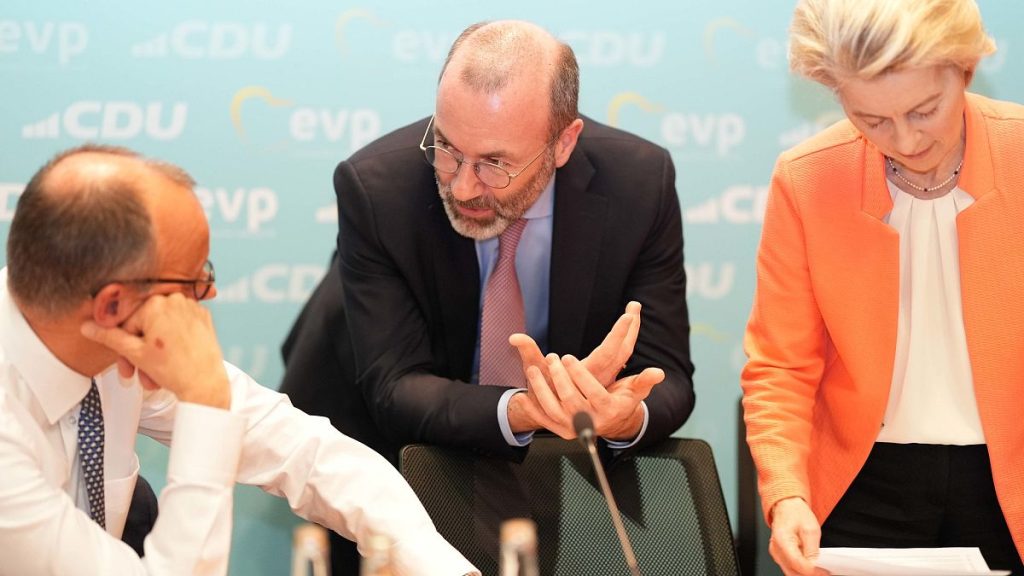The European People’s Party (EPP), the largest political group in the European Parliament, has issued a strong call for a significant reduction in EU regulations, particularly those related to climate change, environmental protection, and corporate sustainability. They argue that these regulations are overly burdensome, especially for small and medium-sized enterprises (SMEs), and are hindering European competitiveness. The EPP proposes a two-year moratorium on implementing new regulations and suggests limiting the scope of existing legislation to companies with over 1,000 employees. They also advocate for streamlining reporting requirements and reducing what they perceive as excessive bureaucracy related to agriculture and forestry, including regulations on set-asides and pesticides, as well as the implementation of the EU Deforestation Regulation. This stance sets the stage for a potential clash with the European Commission as it prepares a package of measures to bolster EU competitiveness.
The EPP’s call for deregulation reflects a broader concern within the center-right party regarding the potential negative impact of ambitious climate targets on European industry and economic growth. They point to the high energy costs faced by European companies compared to their global competitors, arguing that these costs are hindering their ability to compete effectively. While acknowledging the importance of addressing climate change, the EPP expresses skepticism about the feasibility of achieving the Paris Agreement’s 1.5-degree Celsius target and advocates for a more “technology-neutral” approach to climate policy. This translates into opposition to explicit renewable energy targets and mandatory building renovations, both of which are central to the EU’s existing climate strategy. Instead, they emphasize the need for a balanced approach that takes into account economic realities and avoids deindustrialization.
The timing of the EPP’s statement coincides with the European Commission’s upcoming unveiling of several key policy initiatives related to industrial competitiveness, affordable energy, and the transition to a cleaner economy. This includes a Clean Industrial Deal, an Action Plan on Affordable Energy, and a Roadmap towards ending Russian energy imports, all scheduled for release on February 26th. Simultaneously, the Commission is also expected to present a proposal to amend key laws on corporate sustainability and green investment criteria, often referred to as an “omnibus” proposal. This confluence of policy developments sets the stage for a potential political battle between the EPP, which seeks to loosen regulations, and other stakeholders, including unions and environmental groups, who are likely to oppose any weakening of existing environmental and social protections.
The EPP’s deregulation agenda, while framed as a necessary step to boost competitiveness, carries significant implications for the EU’s climate and environmental ambitions. A two-year moratorium on new regulations could delay the implementation of crucial policies designed to accelerate the transition to a low-carbon economy. Limiting the scope of existing regulations to larger companies could effectively exempt a significant portion of the European economy from contributing to environmental sustainability efforts. Moreover, the EPP’s opposition to specific renewable energy targets and building renovation mandates could undermine the EU’s ability to meet its climate goals and its commitments under the Paris Agreement.
The EPP’s assertive stance reflects its belief that it holds a “mandate to lead the EU,” given its status as the largest party in the European Parliament and the alignment of its political affiliation with the current European Commission President, Ursula von der Leyen. However, the EPP’s position is far from uncontested. Unions and environmental groups have already voiced their concerns about the potential erosion of worker rights and environmental protections. They argue that weakening these regulations would not only jeopardize the EU’s climate goals but also undermine social justice and fairness. This sets the stage for a complex and potentially contentious debate over the future direction of EU policy.
The coming months will be crucial in determining the outcome of this debate. The European Commission’s proposals, expected in late February, will offer a concrete framework for discussion and negotiation. The EPP’s influence within the European Parliament will be a key factor in shaping the final legislation. However, the EPP does not hold an absolute majority and will need to build alliances with other political groups to advance its agenda. The outcome of this political maneuvering will have far-reaching consequences for the EU’s ability to balance economic competitiveness with its commitments to climate action and social responsibility. The stakes are high, and the debate promises to be intense as various stakeholders vie for influence in shaping the future of Europe.














